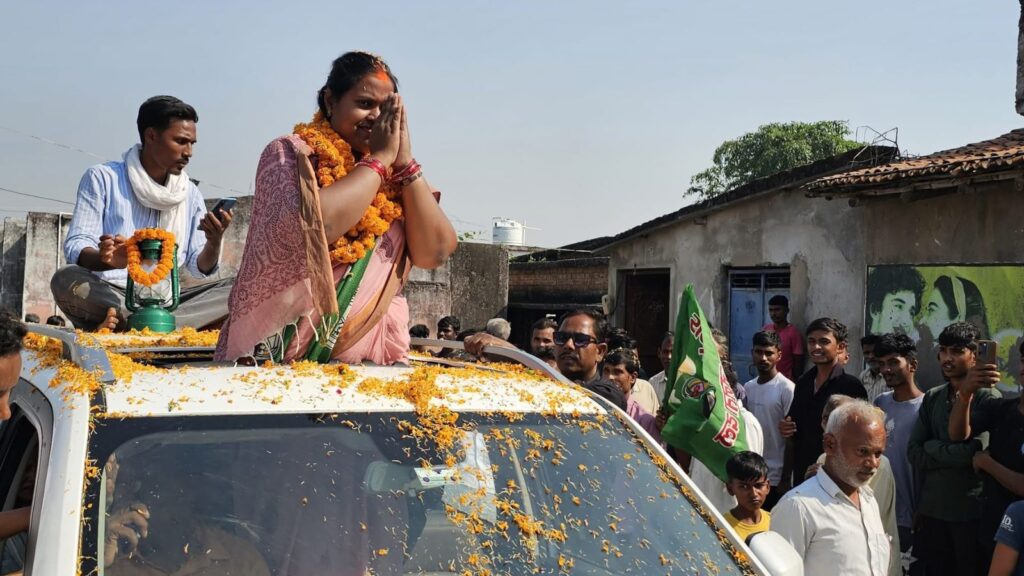On Sunday, the last day of campaigning for the second phase of the Bihar elections, RJD candidate in Gaya’s Imamganj, Ritu Priya Chaudhary, held her roadshow across the constituency. Dressed in a green saree and carrying an RJD flag marked with the photos of Lalu Prasad and Tejashwi Yadav, she greeted people along her route.
In the Imamganj market, Ram Chandra Yadav was keenly watching Ritu’s final canvassing bid. “This time, the lantern (RJD’s symbol) will win from here. Nothing has been done by the NDA government in all these years,” he said.
His friend countered him sarcastically: “So, there is electricity connection in every house without any government work – only thanks to lantern, right?”
The two men then engaged in a debate about the performance of the Nitish Kumar-led NDA government. However, both of them appeared to be on the same page over one thing – the “unravelling” of the Nitish government’s prohibition policy.
“It’s a ban on paper only,” said Yadav. His friend agreed: “Now, liquor is being delivered to homes.”
The ban on alcohol was enforced by the Nitish government in April 2016. However, Imamganj, which borders Jharkhand, does not seem to be a dry belt. Yadav explained, “The drinkers go to neighbouring Jharkhand, have a drink and come back. Everything is available there.”
His friend added, “There’s no need to even go to Jharkhand. You can just make some calls and liquor would be delivered to your doorstep. The ban hasn’t curbed liquor consumption, it just costs more now.”
Story continues below this ad
Such views are echoed by people cutting across caste lines and social groups in Imamganj, where the sitting MLA from the Hindustani Awam Morcha (Secular), Deepa Kumari – the daughter-in-law of party chief and ex-chief minister Jitan Ram Manjhi, an NDA ally – is in the fray.
Imamganj is one of the six seats, mostly in the Gaya region, that Manjhi, currently a Union minister, got as part of the NDA’s seat-sharing pact.
Manjhi, who hails from Gaya, had been the Imamganj MLA for two terms since 2015. It is a crucial seat for him that he had wrested from five-term JD(U) MLA and former Assembly Speaker Uday Narain Choudhary in the 2015 polls, months after quitting the JD(U) and forming the HAM(S).
After he was elected as an MP in the 2024 Lok Sabha polls, Manjhi fielded Deepa from Imamganj in the subsequent bypoll in a bid to hold on to his turf.
Story continues below this ad
While the HAM (S) is contesting five more seats, the outcome of Imamganj could have a bearing on Manjhi’s position. He is a key leader of the Musahar group – among the most deprived Scheduled Castes (SCs) – which accounts for about 3% of the state’s population, with his party having influence in parts of Gaya and Jehanabad districts.
The HAM(S) has fielded Deepa’s mother and party MLA Jyoti Devi from her Barachatti seat.
In the November 2024 bypoll, Deepa had defeated her RJD rival Roshan Manjhi by 5,945 votes, in which Prashant Kishor’s Jan Suraaj, making its electoral debut then, played a spoilsport for the latter as its candidate Jitendra Paswan secured about 37,100 votes.
This time, like the RJD, the Jan Suraaj has also replaced its candidate, fielding a new face Ajeet Kumar.
Story continues below this ad
Voices from the ground indicate that Deepa faces a tough battle in her bid to retain her seat.
Referring to prohibition, an Imamganj resident Satendra Bharti asked, “If liquor is banned in Bihar, how is it still available here? Sections of officials and police are making money. They don’t catch the bootleggers. They only arrest drinkers, jail them, then slap a fine of Rs 5,000-10,000 to release them. This must be stopped.”
A woman voter said that prohibition has made public spaces safer for women, but added that it has not been entirely effective. “Now people drink at home rather than in public. You don’t see open sale of alcohol or roadside drinking because of police fear. But many drunk husbands who used to beat their wives still do it. And since liquor is costlier now, they spend even more on it,” she said.
Several locals argued that prohibition has not reduced crimes and that it has even led many men to turn to drugs or spurious liquor.
Story continues below this ad
Deepak Kumar, 24, flagged unemployment as the root of the problem. “There are no jobs here. People survive on farming, daily wage labour, or small local businesses. Because of this, many remain unemployed and fall into bad company, getting into drugs.”
Ashraf Ali, 38, said, “Like prohibition, several government initiatives exist only on paper in Imamganj. Nitish ji says his government has built the graveyard boundary walls across the state. We had to do crowdfunding six months ago to build one in our village Dhuar. Manjhi ji had been an MLA from here for 10 years, let him name one thing he’s done in this area. He couldn’t even enforce prohibition properly.”
Some locals also pointed out that Imamganj does not have any major college or hospital and that people have to go to Gaya town, 70 kms away, to avail of these services.
The seat falls under the Aurangabad Lok Sabha constituency represented by RJD MP Abhay Kushwaha. An Imamganj resident Prakash Rai said, “Our MP visits the area, but since the RJD is not in power, their funds are limited. Nitish ji built many things, but change is needed now.”

